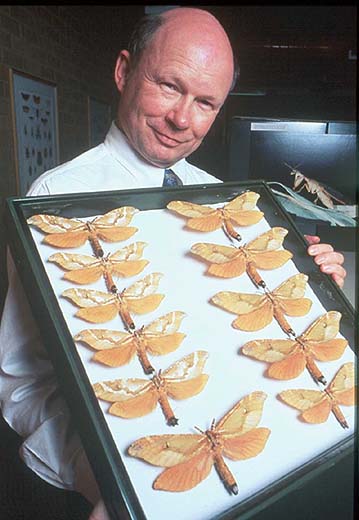It all began with a collection of moths
This year, the international Ebbe Nielsen Prize was for the first time awarded to a Danish researcher – Jens-Christian Svenning, Professor of Ecoinformatics at Aarhus University. Behind the international prize with the Danish-sounding name is a story about a boy from Ry in Eastern Jutland who had an unusual interest and lots of energy.

Ebbe Schmidt Nielsen (1950–2001) was the son of a farmer. He used to play with his brother in the woods around the farm in the hilly Silkeborg area and at the nearby Mossø lake. He was inspired by his father, who rose early to go birdwatching before breakfast and a mother who introduced him to books about insects and plants at an early age.
Studies at Aarhus University followed, as did a research project on the ecosystems in Danish beech forests. Due to his formidable ability to identify Danish moth and butterfly species, he was encouraged to include this knowledge in his research project. He discovered to his great surprise that no complete list of Danish moth species existed, so the preparation of such a list became his next project and the topic of his PhD studies at the University of Copenhagen.
Expedition to South America
In 1978–79, he went to Argentina with a group of fifteen Danish researchers, where he participated in an extensive eight-month expedition. As a result of this trip, Ebbe Nielsen was smitten for life with the diverse fauna of the southern hemisphere, and the expedition was soon followed by others, including one to Chile. It was therefore no surprise that the CSIRO (the Commonwealth Scientific and Industrial Research Organisation) asked him to come to Australia in 1981 and continue his work there.
Ebbe Nielsen’s tireless, energetic and enthusiastic work with research and communication made him internationally renowned and appreciated at an early age. He became a member of institutions such as the American Academy of Sciences and the Royal Danish Academy of Sciences and Letters, and received great recognition from a number of research institutions and his many colleagues around the world who appreciated his commitment and openness.
Recognition of biodiversity
When biodiversity became a topic on the agenda in the 1990s, Ebbe Nielsen was way ahead of the rest of the world in recognising that knowledge of the diversity of species and their characteristics is essential if we want to continue utilising the many resources biodiversity has to offer. He realised at an early stage that the growing amount of data about the condition of our planet must be interlinked and easily available to researchers if we are to develop the knowledge required for action.
This led to the establishment of the GBIF (Global Biodiversity Information Facility), which links existing databases about biodiversity with new databases all over the world. This initiative originated in Australia, where Dr Nielsen played a key role in the project, which was finally approved by the OECD in 1999. He was on his way to the founding conference of the GBIF in Montreal to suggest that Australia assume the role of secretariat for the organisation when he died suddenly from heart failure in his bed in Chile, childless and only 50 years old.
The Ebbe Nielsen Prize
The news about Dr Nielsen’s untimely death was, of course, a shock to the participants in the founding GBIF conference, but they quickly decided to implement the ideas despite the loss of one of the organisation’s key individuals.
The same GBIF conference agreed on the spot to create an annual prize amounting to USD 35,000 in his honour. It was awarded for the first time in 2002, and as already mentioned, was awarded this year to a Danish researcher for the first time.
Jens-Christian Svenning intends to spend the money to continue his informatics-based research (ecoinformatics), which uses large amounts of data on biodiversity, ecology, environment, climate and phylogenetics (the evolutionary relationship between species) to throw light on complex ecological questions. These questions include basic biology questions, particularly what determines the distribution of species diversity on Earth, as well as important strategic questions such as the potential impact of future climate change on biodiversity and ecosystem services.
Today, the Danish branch of GBIF – DanBIF – has its secretariat in Copenhagen. Sixty-two institutions form part of this network, which currently gives access to thirty-eight Danish datasets regarding biodiversity.
The aim of the organisation is to make all information on biodiversity freely available via the Internet, and the GBIF currently gives access to more than 300 million biodiversity records via its portal data.gbif.org.
Read more
Jens-Christian Svenning awarded the Ebbe Nielsen Prize:http://science.au.dk/en/news-and-events/news-article/artikel/au-forsker-modtager-international-pris-for-forskning-i-biodiversitet/